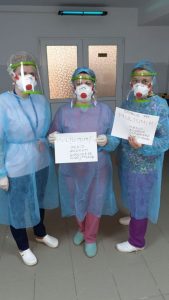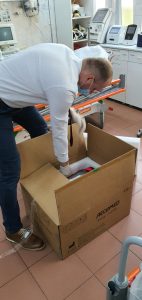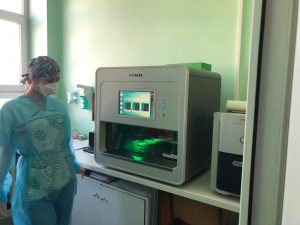Baptism by fire: how Romania’s community foundations rallied in the face of COVID-19
07 Sep 2020
In the face of COVID-19, 17 community foundations from across Romania came together to raise funds for vital public health services and vulnerable groups. They helped to secure and direct more than €1.8 million in essential medical equipment and emergency aid to vulnerable groups. At the outset of the pandemic, none had previous experience in medical procurement or health infrastructure, nor in being part of such a large-scale response. What the Romanian experience demonstrates is that large-scale results are often best achieved through strong cross-sector coordination, rather than from the isolated intervention of individual organizations.
The GFCF invited George Gurescu of the Association for Community Relations (ARC) – the support organization for Romanian community foundations – to describe what happened. Alongside his story, sidebars capture key insights and lessons about what worked and why.
On 26 February 2020, the first case of COVID-19 was registered in Romania. Within two months, the number of cases had reached 10,000 and the country was facing one of the biggest health crises in its history.
Romania has the lowest spending on healthcare per capita in the European Union, and many of its doctors and nurses have left for better paid jobs in Western Europe. As the virus spread across countries like Belgium and Italy, straining health systems in those countries, it was clear that Romania’s health services would struggle to cope. News stories about the acute shortage of equipment and medicine revealed how unprepared hospitals were.
“I was shocked to find out that the medical personnel did not have protective equipment. ‘If someone comes to me with COVID-19,’ they would say, ‘I have nothing to protect myself!’” recalls Daniela Chesaru of the Timișoara Community Foundation. By early March, lack of personal protective equipment (PPE) among frontline medical personnel had become a recurrent issue across the country. “At customs, in the border area, everyone was calling us asking for help, to give them a mask, a face shield – anything – because they had nothing,” adds Daniela.
The creation of place-based emergency funds
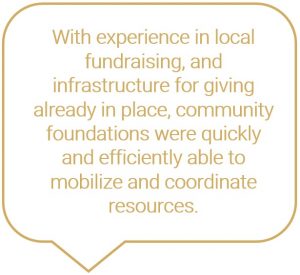 The decision to get involved was “quite easy”, says Liliana Cristea of the Galați Community Foundation: “It seemed like something we had to do. I felt the need to help because all the signs led to a scenario that didn’t look good at all. Our Executive Team mobilized quickly, and the board was also very involved, supporting the establishment of an emergency fund from the beginning. Our online fundraising platform, which had already been set up for our annual half marathon, was quickly converted into a fundraising platform for the Galați is Safe Fund. This meant that we gained time by not having to set up a platform from scratch. The graphics were created overnight, and we started our campaign.”
The decision to get involved was “quite easy”, says Liliana Cristea of the Galați Community Foundation: “It seemed like something we had to do. I felt the need to help because all the signs led to a scenario that didn’t look good at all. Our Executive Team mobilized quickly, and the board was also very involved, supporting the establishment of an emergency fund from the beginning. Our online fundraising platform, which had already been set up for our annual half marathon, was quickly converted into a fundraising platform for the Galați is Safe Fund. This meant that we gained time by not having to set up a platform from scratch. The graphics were created overnight, and we started our campaign.”
Many other community foundations in the country were in the same situation. In the first part of a normal year, most organize annual fundraising sporting events in their communities, such as marathons, swim-a-thons and cross-country races. Funds raised support dozens of projects in each community, and participation fees go towards community foundations’ operating costs. The events are always extremely popular: not only do they raise money, but they also contribute towards a sense of community spirit. Unsurprisingly, COVID-19 brought everything to a halt.
The Timișoara Community Foundation had already organized the teams that were supposed to participate in Timotion, their annual springtime running event (which, in 2019, had raised €99,462). In early March, when it was clear that the event wouldn’t be happening, the foundation’s team decided to use their existing donation platform to raise funds for local hospitals, joining forces with Școala Mamei Junior, a local civil society organization.
“We realized that we had the capacity to raise funds quickly and efficiently. We already had the Timotion participants, as well as around 8,000 existing supporters, so it was fairly straightforward to ask them – and other corporate and civil society partners – for help. In the first phase, we decided to direct resources to the Victor Babeș Infectious Disease Hospital, because all the COVID-19 cases in the region were being sent there and that was the biggest priority at the time,” says Daniela.
Meanwhile, 350 kilometres away in central Romania, the Ţara Făgărașului Community Foundation had already been planning what would have been its first foray into fundraising for public health services, with a campaign to raise money for the paediatric department of the local hospital. As the pandemic took hold, the foundation switched track, instead launching the Together for Health Fund, coordinating closely with local authorities to align efforts and avoid any duplication.
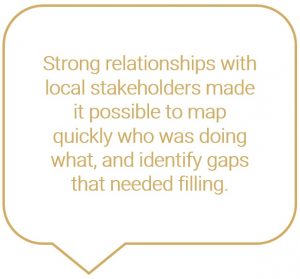 “We organised a Zoom meeting with our Board of Directors and the hospital manager, who advised us on what they still needed. We have very good relationships with the local authorities and the hospital. We are the largest NGO in the area, so people counted on us and potential donors were sent directly to us,” says Cristiana Metea of the Țara Făgărașului Community Foundation.
“We organised a Zoom meeting with our Board of Directors and the hospital manager, who advised us on what they still needed. We have very good relationships with the local authorities and the hospital. We are the largest NGO in the area, so people counted on us and potential donors were sent directly to us,” says Cristiana Metea of the Țara Făgărașului Community Foundation.
For the Banatul Montan Community Foundation, the newest community foundation in Romania, the pandemic presented an early test of its ability both to be part of a joint emergency response and to galvanize its local community. By mid-July, the foundation – which serves one of the least populated counties in Romania with fewer than 300,000 residents – had raised €80,347 for its COVID-19 Response Fund.
A chain reaction of generosity
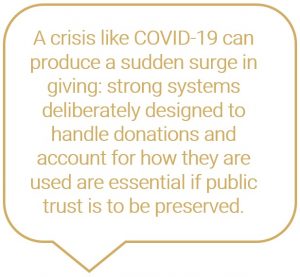 The Banatul Montan Community Foundation’s first action was in response to a call for assistance from the local emergency reception medical unit sent via social media. Director Răzvan Fodor quickly realised that the foundation could offer more: “I analysed the situation and thought we could get a lot more out of the campaign if we transferred it to our website and did the fundraising ourselves. In fact, our involvement could add value by bringing credibility and transparency.” The response was overwhelming: on the first night alone, the foundation managed to raise 60% of the fundraising target.
The Banatul Montan Community Foundation’s first action was in response to a call for assistance from the local emergency reception medical unit sent via social media. Director Răzvan Fodor quickly realised that the foundation could offer more: “I analysed the situation and thought we could get a lot more out of the campaign if we transferred it to our website and did the fundraising ourselves. In fact, our involvement could add value by bringing credibility and transparency.” The response was overwhelming: on the first night alone, the foundation managed to raise 60% of the fundraising target.
It was a similar story across the country: the Țara Făgărașului Community Foundation raised €100,000 from a population of just 140,000, and the Timișoara Community Foundation reported that the €211,000 it raised in five weeks (including both cash and in-kind donations) exceeded the total funds it had raised during the entire first two years of its existence.
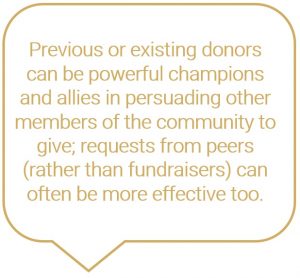 Corporate donors also stepped forward. One of the largest companies in the county donated €50,000 to the Galați Community Foundation, and the Banatul Montan Community Foundation asked corporate supporters of its annual fundraising event (Running in the Forest) to give towards its COVID-19 response work. As they began to give, other companies followed suit – a chain reaction of community generosity was the result, which saw each act of giving inspire others to give as well.
Corporate donors also stepped forward. One of the largest companies in the county donated €50,000 to the Galați Community Foundation, and the Banatul Montan Community Foundation asked corporate supporters of its annual fundraising event (Running in the Forest) to give towards its COVID-19 response work. As they began to give, other companies followed suit – a chain reaction of community generosity was the result, which saw each act of giving inspire others to give as well.
Coordination in the midst of confusion
COVID-19 inspired unprecedented levels of public generosity in Romania, and the trust shown to 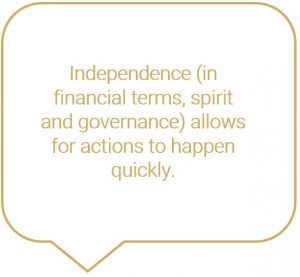 community foundations needed to be met with unimpeachable and effective handling of funds. But the situation was volatile and fast-changing, and levels of fear and confusion often ran high. Careful coordination between community foundations, other non-profits and public health providers, and the creation of a National Emergency Fund by ARC to supplement local fundraising efforts, all helped to streamline and join up efforts and allowed information to flow quickly between different parts of the country. At a time when the going rate for a simple surgical mask was five times the normal price, when medical staff were trying to plan for a situation which was entirely unprecedented, and when the government’s response was slow, civil society networks managed to remain one step ahead of the game.
community foundations needed to be met with unimpeachable and effective handling of funds. But the situation was volatile and fast-changing, and levels of fear and confusion often ran high. Careful coordination between community foundations, other non-profits and public health providers, and the creation of a National Emergency Fund by ARC to supplement local fundraising efforts, all helped to streamline and join up efforts and allowed information to flow quickly between different parts of the country. At a time when the going rate for a simple surgical mask was five times the normal price, when medical staff were trying to plan for a situation which was entirely unprecedented, and when the government’s response was slow, civil society networks managed to remain one step ahead of the game.
“The fact that we had the working group with the other community foundations helped us a lot, because we made good use of the experience of others. Various questions were raised there and, even if no one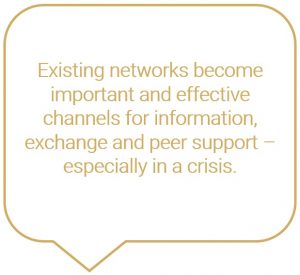 knew the exact answer, we could come up with new ideas and solutions together. It was a very important support hub,” remembers Liliana.
knew the exact answer, we could come up with new ideas and solutions together. It was a very important support hub,” remembers Liliana.
Take the purchasing of medical supplies, for example. Local hospital staff would draw up lists of essential equipment and, working together, the community foundations would work out how best to access supplies, learning in the process how to navigate volatile markets, where prices were high and stocks were low. “Prices for protective gear were shocking. You couldn’t believe how expensive a mask could be. It was like they were made of gold,” Liliana recalls.
Ordering equipment was one thing, but delays in delivery were another. “Our first mask order was also the most nerve-wracking. It was a joint order with other foundations. We were promised that the masks would arrive in two or three days. I was stressed because they only arrived after a month. The suppliers kept postponing, telling us different stories: that they were ordered, but held in customs, then [it turned out] that they had in fact not even been ordered!” shares Răzvan. Similarly, two ventilators ordered by the Țara Făgărașului Community Foundation in March only arrived at the hospital in June. Sourcing equipment directly – rather than simply ordering it – became a priority. “At one point, we realized that actual supplies were more important than money. Procurement was taking too long and, until the products arrived, we felt that we were wasting a lot of time. We were happy every time we found a supply of masks that could be delivered to the hospital the very next day,” adds Daniela.
Public trust as an essential commodity
In addition to money, public support for community foundations took many forms, including in-kind donations, volunteering etc. In Făgăraș, Cristiana went from house to house collecting donations for the Together for Health Fund: “The involvement of the community has been extraordinary. I have no words…They mobilized, not necessarily to raise money, but to help us as best they could. When the elderly would call us for help with their medical check-ups, we recruited volunteers to take them by car. A lot of people donated time and got involved in our activities.”
“I have never felt cooperation as strongly as I did in this period. In five weeks, I felt all of the love, the work, the energy and resources that we have been carefully building over the four years of the foundation’s existence,” says Daniela. When suppliers could not be found to deliver goods or materials quickly, community foundations sought other solutions: workshops on how to make face masks were set up, for example, and some companies halted production, handing over their own stock of PPE to the foundations and hospitals.
Networks for good
Throughout, we at ARC tried to fill gaps and respond to urgent needs, matching the financial resources of the National Emergency Fund with the evolving situation on the ground. For us, the pandemic validated what has been 19 years of work to build an infrastructure – or “networks for good” – for philanthropy in Romania.
When local requests for help became too much for individual community foundations to be able to handle, ARC was able to provide additional support. In our daily discussions with community foundations, we kept a careful inventory of the needs of hospitals across the country and sought to buy in bulk (and, by doing so, secured lower costs). For example, we bought 7,400 coveralls which were distributed across the country with the help of 31 organizations, including community foundations and hospitals.
A national response from Bucharest
In Romania’s capital, the Bucharest Community Foundation established a nation-wide Emergency Fund for Vulnerable Communities aimed 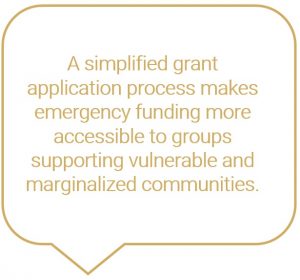 specifically at helping vulnerable and marginalized communities. Information about the Fund was disseminated via the community foundation network, with simplified proposals submitted directly to the Bucharest Community Foundation, who were responsible for assessing them. “Everything was extraordinarily urgent and immediate. It was very difficult to choose between – for instance – the children from Argeș and the children from Târgu Mureș. They were all in the same risky situation. How does one make a choice? We found some very imperfect formulas such as geographic balance,” Alina explained.
specifically at helping vulnerable and marginalized communities. Information about the Fund was disseminated via the community foundation network, with simplified proposals submitted directly to the Bucharest Community Foundation, who were responsible for assessing them. “Everything was extraordinarily urgent and immediate. It was very difficult to choose between – for instance – the children from Argeș and the children from Târgu Mureș. They were all in the same risky situation. How does one make a choice? We found some very imperfect formulas such as geographic balance,” Alina explained.
By mid-May, the Fund had disbursed €175,255 to support 11,000 people through grants to 46 organizations and groups, in Bucharest and 22 other counties. Of the funds raised, €75,255 came from online donations from ING bank customers. “It was an absolute record for online banking campaigns, given that an average donation is around €10. €30,000 was raised on Easter weekend alone,” Alina remembers.
The experience of administering the Fund highlighted stark inequalities between Bucharest and other parts of the country. “I realize that the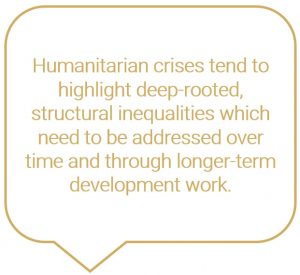 priorities we set for Bucharest are still good,” observed Alina, “but they are less relevant and appropriate for the rest of Romania. It will take a lot of money and a lot of work to get the country out of poverty,” she concludes. In this sense, she notes, the Fund offered only temporary respite. “The fact that we give food for a week or two does not solve the problem, but at least it prevents things from getting worse.”
priorities we set for Bucharest are still good,” observed Alina, “but they are less relevant and appropriate for the rest of Romania. It will take a lot of money and a lot of work to get the country out of poverty,” she concludes. In this sense, she notes, the Fund offered only temporary respite. “The fact that we give food for a week or two does not solve the problem, but at least it prevents things from getting worse.”
The hard road to “normality”
COVID-19 response work has been a transformative experience for Romania’s community foundations. It has tested their resilience and deepened their community roots, inspiring them with new confidence, courage, and energy. The pandemic has created new challenges too, however, to which community foundations will have to adapt and respond: programmes will need to be rethought, budgets rebuilt, and their role in the community reconsidered.
“There was enormous satisfaction in doing something that had an immediate impact. However, financially, on the administrative side, the foundation has been affected. If we now return to our partners and ask them to donate to other projects, they might tell us that they have already helped us,” says Cristiana. Others share similar concerns about their financial position. Răzvan, for example, is unsure how many people will turn out to participate in their annual fundraising event in a few weeks’ time.
One priority moving forward will be to retain both new and longer-term donors, even if it means adapting the flagship programmes that have been instrumental in the past in keeping community foundations connected to the community. The Țara Făgărașului Community Foundation, for example, successfully moved their annual Bike-a-thon online, and the Bucharest Community Foundation transformed its annual Swim-a-thon into a Swim-at-Home event (raising €116,475 from almost 4,300 donors).
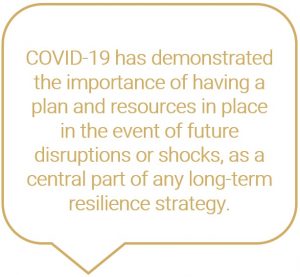 COVID-19 has also highlighted the importance of having an emergency reserve or fund that can be swiftly deployed in a crisis. “If we had had something similar ready to go, we would have been more relaxed. We are convinced that it is very important to be ready for a crisis, and we will think about how we can be more prepared in future. I don’t yet know if we will transform our current Emergency Fund or not, but we are thinking very seriously about what kind of response tool might be most useful,” says Liliana. “I have realized that every day, every second counts, and it can make the difference, for example, between buying products at decent prices, or three times more expensive in a matter of days,” notes Daniela.
COVID-19 has also highlighted the importance of having an emergency reserve or fund that can be swiftly deployed in a crisis. “If we had had something similar ready to go, we would have been more relaxed. We are convinced that it is very important to be ready for a crisis, and we will think about how we can be more prepared in future. I don’t yet know if we will transform our current Emergency Fund or not, but we are thinking very seriously about what kind of response tool might be most useful,” says Liliana. “I have realized that every day, every second counts, and it can make the difference, for example, between buying products at decent prices, or three times more expensive in a matter of days,” notes Daniela.
The situation in Romania continues to be a cause for concern. Since mid-June, the number of cases has been increasing. On 21 August alone, more than 1,392 new cases were registered, which is more than during the state of emergency in the spring, when the number was closer to 500. Fortunately, the community foundations have not yet closed their fundraising campaigns, and some of them even have reserves ready in case of future waves. They are cautious, and aware that the pandemic will not go away in the short-term. There may no longer be the same drive amongst local communities to give, but overall, and thanks to their early response to COVID-19, Romanian community foundations are equipped with both the experience and a strong basis of trust from which to build in the future.
By: George Gurescu, Communication Specialist, Association for Community Relations (ARC)
About the Romanian community foundation movement
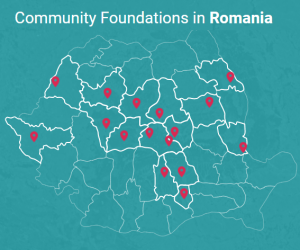 In Romania, the first cornerstones of the community foundations movement were laid by the Association for Community Relations (ARC). For more than a decade, ARC has been working with communities across the country, inspiring leaders and helping to establish and develop foundations. The first community foundation was set up in 2008 and, since then, 18 more have been established in Romania.
In Romania, the first cornerstones of the community foundations movement were laid by the Association for Community Relations (ARC). For more than a decade, ARC has been working with communities across the country, inspiring leaders and helping to establish and develop foundations. The first community foundation was set up in 2008 and, since then, 18 more have been established in Romania.
The Romanian community foundations work to develop local philanthropy, and support those who want to make a positive change in their community. Between 2008 and 2019, community foundations channeled a total of €8.84 million back into communities. ARC receives support from the Charles Stewart Mott Foundation and Romanian American Foundation.


